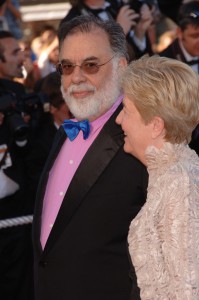John Cleese, who has made the world laugh with his friends in Monty Python, said having lunch with the Queen of England was a great awakening for his palate.
The Queen served two slightly sweet German whites and Cleese realized his preference for luscious over ascetic wines didn’t make him unsophisticated. The star in “Wine for the Confused” videos had a sigh of relief.
Cleese, the towering 6’5″ comic, will be performing at the Lincoln Theatre in Yountville Nov. 11. The Brit, who now lives in Santa Barbara, was lured to California by sunshine and, yes, his love of wine.
The wine enthusiast, now 70, made several light-hearted wine vides in 2004, and he said it was great fun to meet the winemakers because they think like artists. “They’re obsessed with doing something absolutely as well as they can, and money becomes much less important to them, which makes them very attractive creatures.”
Cleese doesn’t have anymore wine videos in the offing. “I’d like to make more wine videos, but I’m not sure what information I would be qualified to put across,” he said. “I think “Wine for the confused” worked because I’m good at simplifying complex information, which makes the video a good introduction.”
What are his wine doings to date? “My wine exploits consist simply of drinking it. I’ve become more and more fascinated by the sheer variety of tastes and textures …”
Of course most people don’t know Cleese as a wine connoisseur but rather as that looney Mr. Praline, the man with the dead Norwegian blue parrot in the Cheese Shop in Monty Python’s Flying Circus. The show aired on the BBC-Television from Oct. 1969 to Dec. 1974, but has endless reruns, keeping new generations laughing. Other Cleese credits that followed that quirky comedy include Monty Python The Holy Grail, James Bond and Harry Potter films, as well as “A Fish Called Wanda,” in which he was nominated for Best Original Screenplay.
What follows is a Q&A with Cleese, the man who studied law at Cambridge, but traded up for comedy.
Q: When did you first know you wanted to be a comic? Did something in childhood happen to give you a clue?
A: When I was at Cambridge I did a show at the local professional theatre with some other guys, and a London impresario told us that he wanted to take the show to London’s West End. Until then it had never occurred to me I could earn a living in this way, and it certainly beat becoming a lawyer. But it’s true that in childhood I could overcome my social ineptness by making people laugh.
Q: What was the best part of creating and performing in Monty Python? Favorite Monty Python character?
A: The best part of Monty Python was making each other laugh. We had no idea what our “audience” was, so this was our only criterium. The happiest moment that I can remember was reading out the Cheese Shop sketch, and making Michael Palin laugh so much he literally fell off his chair. My favorite Monty Python character was Mr. Equator, who arrives at a party and behaves badly.
Q: What did that show do for comedy? Do you think it was precedent-setting?
A: I think Monty Python changed comedy because it did away with a lot of the comedy conventions that seemed to imprison all the writing at that time – things like, how sketches should end, and how long they should be, and what sort of content they should have, which had previously been based on the requirements of sketch shows performed on stage.
Q: In a 2005 poll called “The Comedians’ Comedian” you were voted #2, second only to Peter Cook(CQ). What’s your
reaction to that?
A: I think these polls are rather silly, like most of the awards. Saying A is better than B strikes me as next to meaningless. I wish there were just unranked awards for people who do exceptionally good work.
Q: What was your favorite movie role and why?
A: Donald Sinclair in Rat Race. I loved wearing those terrible teeth, and flashing that murderous grin. Playing someone so shameless was very liberating. It was also a roll beautifully written by Andy Breckman.
Q: In your upcoming show at the Lincoln Theatre what themes do you touch on?
A: The show is really, about my career in comedy, with a bit of auto-biography about why, and how I became a comic, and also my experiences working with Peter Sellers, Ringo Starr, Marty Feldman, Steve Martin, the Pythons, Jamie Lee Curtis, Kevin Kline, and of course the Arch Bishop of Canterbury.





